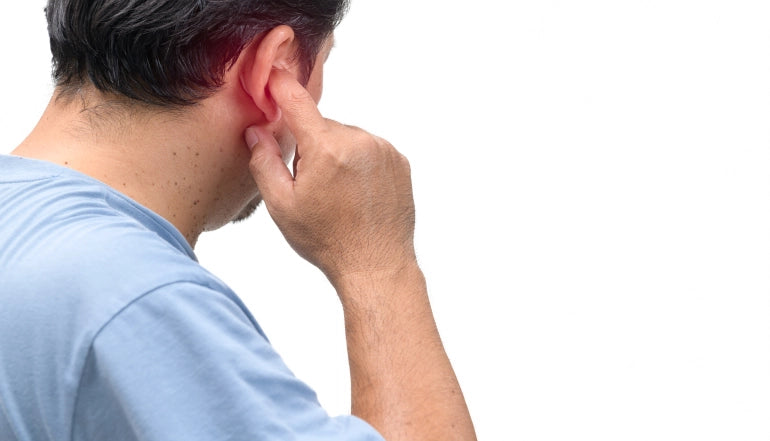Do you wear hearing aids and occasionally experience itchy ears? There are actually a few potential causes of itchy ears when wearing hearing aids, most of which are the result of earwax buildup. Too much wax could make your hearing aids push wax deeper into the ear canal, irritating the ears. It can also cause moisture to occur inside your ear canals, making them itch. If your hearing aids haven’t been cleaned recently, they might have wax and debris that is irritating the canal portion of your ear.
Learn what to do if you notice your ears are regularly itching and causing discomfort, including visiting a physician to determine the cause.
How To Potentially Prevent Itchy Ears While Wearing Hearing AidsThere are a few key things you can do to reduce your chances of having itchy ears while wearing hearing aids:
 Clean Your Hearing Aids Regularly:
Clean Your Hearing Aids Regularly:
By cleaning your hearing aids frequently throughout the week, you’ll help to keep them free of debris, moisture, and wax, all things that can make your ears itch. To clean your Nano OTC hearing aids, you should:
- Remove the dome (if using) from the hearing aid tip
- Use a dry cloth or alcohol wipe to clean the body of the hearing aid
- Use a hearing aid brush or a dry cloth to gently remove debris and wax from the tip of the hearing aid (it’s important to have the ear tip free of wax or debris as blockage might result in feedback or limited sound)
- Change the wax guard if unable to remove wax from the tip of the hearing aid
- We recommend changing the dome every three months (however, change the dome sooner if it’s stiff, brittle, or discolored)
- After cleaning your hearing aid, securely connect the dome (if using) to the tip of the hearing aid
 Keep Your Ears Dry:
Keep Your Ears Dry:
Always make sure your ears are dry before wearing hearing aids to prevent moisture buildup, which can lead to itchy ear canals and sometimes chronically itchy ears.
 Make Sure Your Hearing Aids Fit:
Make Sure Your Hearing Aids Fit:
When hearing aids don’t fit properly, it can cause them to rub against the ear canal. Your Nano OTC hearing aids will come with a variety of dome types and sizes - choose the ones that fit comfortably in your ear, without causing irritation. Try a different dome size if you notice your ears itching.
 Practice Good Ear Hygiene:
Practice Good Ear Hygiene:
Keep the outer ear and the opening of the ear canal clean by wiping it with a damp cloth. Avoid using a cotton swab, since this can push ear wax deeper into the ear and make your itching worsen.
Most people don’t realize that the ear canals are self-cleaning and therefore don’t typically require you to clean them.

Self-cleaning occurs from normal skin migration patterns and as our jaws move, it naturally pushes out old ear wax away from the ear canal to the ear opening, where the wax dries up and falls out or washes away.
It’s always a good idea to visit a physician if you are experiencing itchy ears, as sometimes the causes can be unrelated to hearing loss or hearing aids and may be due to skin allergies, seasonal allergies, ear infections, cleaning your ears too often, and other reasons.
Can Itchy Ears Be an Early Sign of Hearing Loss?If you don’t currently wear hearing aids, but you experience irritation in your ears, you might be wondering if it’s an early sign of hearing loss. Itchy ears alone are not typically considered to be an indicator of hearing loss. However, some allergies and infections can affect hearing and therefore could require medical treatment to prevent hearing complications.

Yes, excessive wax can lead to an earwax blockage of the ear canal, causing difficulty hearing. However, once the blockage is removed, hearing typically improves. If you experience sudden hearing loss or severe hearing loss, seek medical attention immediately as it could indicate a more serious underlying condition.
Additional Causes of Hearing LossIn addition to earwax buildup, below are other potential causes and risk factors that can increase your likelihood of experiencing hearing loss:
- Age: The risk of hearing loss tends to increase with age.
- Noise Exposure: Repeated exposure to a loud noise can damage the inner ear.
- Genetics: Hearing loss can be passed down genetically in families. In this case, getting your hearing tested regularly is important for early detection, as hearing tests can identify changes in your hearing ability over time.
- Occupational Exposure: Working jobs in an environment where there are loud noises can put someone at a higher risk of having hearing loss.
- Ear Infection: Chronic ear infections can potentially lead to hearing loss.
- Medical Conditions: Diabetes, high blood pressure, cardiovascular disease, and other conditions can put someone at higher risk of developing hearing loss.
- Medications: Some medications can be ototoxic, potentially harming the inner ear.
- Head Injuries: Certain head injuries can cause hearing loss.
- Use of Headphones: Listening to music or sounds through headphones for extended periods of time can put people at a higher risk of developing noise-induced hearing loss.
While ear wax buildup and itchy ears don’t typically result in needing hearing aids, you might benefit from hearing aids if you experience symptoms of perceived mild to moderate hearing loss or severe hearing loss.

You might have perceived mild to moderate hearing loss if you experience any of the below:
- Trouble hearing conversations in noisy places and with a lot of background noise or loud sounds
- Difficulty hearing someone on the phone
- Feeling tired from listening
- Finding it difficult to follow conversations and hear people in group settings
- Needing to turn up the volume on the TV or radio, even if others say that it’s loud
You might have severe hearing loss if you have the below symptoms.
- Difficulty hearing loud noises, even in quiet environments
- Difficulty hearing conversations
- You might find yourself reading lips as a result of your hearing loss
If you suspect you have severe/profound hearing loss, you should schedule a consultation with a hearing healthcare provider or physician. They can conduct various hearing tests to determine the severity of your hearing loss, causes, and next steps for treatment (such as prescription hearing aids).
OTC Hearing Aids For Perceived Mild To Moderate Hearing Loss
Many people with perceived mild to moderate hearing loss have found it beneficial to wear hearing aids that are OTC, as they can be a great solution for improving hearing. These FDA-regulated devices don't need a prescription, hearing exam, or doctor's appointment. You can try them in the comfort of your home, and you can adjust the volume to suit your specific needs. With Nano OTC hearing aids, you simply pick the best dome size for your ears, turn them on, and put them in. Keep in mind it might take several days or weeks for your ears and brain to get used to them, which is why Nano OTC Hearing Aids comes with a 45-day money-back guarantee and free 24/7 lifetime support.
Shop Nano OTC Hearing Aids



